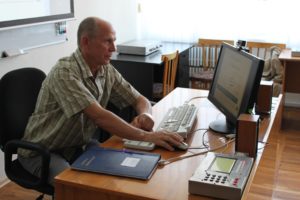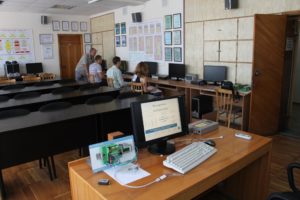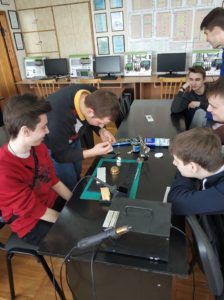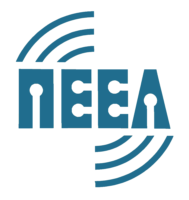Laboratory “CONTROLLERS, MICROCONTROLLERS, MICROPROCESSORS AND SYSTEMS IN ED”.
Areas of activity of the laboratory.
Educational direction.
The laboratory was established in 1986 in connection with the introduction of the curriculum of student training, production and reading of disciplines “Application of microprocessors in the design and technology of REA”, “Microprocessors and microcomputers in REP”. During the years of existence of the laboratory, its material base, thanks to the efforts of its employees, was repeatedly practically full re-equipment, constantly updated, so that at each particular moment of time was equipped with modern microprocessor equipment.
At present, the laboratory is intended for conducting a laboratory practice, practical classes, independent work on disciplines: “Fundamentals of controller programming”, “Computer and microprocessor tools”, “Microcontrollers in embedded systems”, “Intelligent REA and systems”, “Radio electronic equipment of intellectual building “,” Radio electronic equipment of intellectual technology “,” Industrial controllers “,” Computer simulation “, as well as for the implementation of diploma projects, master’s works and research work stud Consumer Care.
Scientific research directions of the laboratory activity:
– conducting laboratory, practical and independent work of students on microcontroller and microprocessor topics;
– conducting laboratory, practical and independent work of students on industrial controllers and HMI;
– conducting laboratory, practical and independent work of students on wireless sensor networks;
– Electives for programming microcontrollers with the involvement of leading IT companies (EKTOS, Global Logic, SAS Automation, ELAKS);
– preparation of students for participation in international and all-Ukrainian competitions on programming of microcontrollers and PLC;
– Constant participation in competitions XploRe New Automation Award from the German company Phoenix Contact Gmb & Co. KG as an EduNet laboratory.
– conducting research on wireless sensor networks and IoT
– conducting research works on the creation of drones and flying sensory networks
– conducting research works on industrial IoT (IIoT)
– Roundtable APAAU (Association of Industrial Automation of Ukraine)
Basic hardware and software:
PLC (programmable logic controllers)
6 stands of ILC 130 Starterkit from Phoenix Contact, which are used within the EduNet international educational network. Used to study programming languages (IEC61131-3) FBD, LD, ST, Il, SFC and works on creating HMI;
1 ILC 390 from Phoenix Contact, which is used to study the industrial networks PROFINET, INTERBUS, PROFIBUS;
1 ILC 150 of Phoenix Contact, which is used to study wireless industrial networks;
Automationworx licensed software (PCWORX, VISU +, VebVisit) and PHOENIX AUTOMATION soft SUITE 2016;
Industrial PC Phoenix Contact;
3 HMI Phoenix Contact kits.
Microcatlors and microprocessors
3 stand EV8031 / AVR (8-bit microcontroller MCS-51, AVR) of Open System, which is used to prepare teams for participation in the International Olympiad on Programming of Firmware and Microcontroller Systems
10 stands for ML-1 (8-bit AVR microcontroller) with a rephire, used to study programming languages Assembler and C
10 Arduino UNO, used for optional microcontroller playback
10 stands ML-2 (8-bit microcontroller AVR)
20 ESP8266 (ESP12E) used to study microprocessors
2 sets of MSP430-based developers (16-bit MSP430 microcontroller) from Texas Instruments
4 sets of STM32 MCU Nucleo F401RE (STM32 ARM Cortex-M3 32-bit Microcontroller and Cortex-M4) from STMicroelectronics
2 sets of STM32 STM32F303VC F401RE (32-bit microcontroller STM32 ARM Cortex-M3 and Cortex-M4) STMicroelectronics
Software – CodeVisionAVR Evaluation, AVR Studio, MCStudio, Eclipse
Wireless Touch Networks
A hardware complex for researching models of wireless sensor networks based on the received equipment from the American company Texas Instruments on the project European University Program consisting of two sets «СС2530ZDK», adjustment kit «CC2530 ZigBee Mini Kit», an experimental board «MSP-EXP430FG4618», a programmer «MSP-FET430UIF», «SmartRF Studio» software
2 Xbee (XBee Series 2) complete ZigBee modules that support the ZigBee-2007 specification and allow you to build a mesh network
5 sets of CC2530 (transceiver and core 8051)
Single Paying Computers:
2 Raspberry Pi (built on the Broadcom BCM2835 system-on-chip (SoC), which includes an ARM processor with a clock speed of 700 MHz, a video processor VideoCore IV)
Orange Pi (Cortex-A7 Quad-core H.265 / HEVC 4K, 1.6 GHz) Single-chip computer on ARM processor, manufacturer of Shenzhen Xunlong Software.
C.H.I.P runs on 1GHz Allwinner R8 with 512Mb RAM, 4GB eMMC, Built-in Wi-Fi and Bluetooth 4.0.
Major achievements over the past 5 years:
a) grants, works at the request of foreign representatives.
2013-2017 Implementation of the project 544010-TEMPUS-1-2013-1-DE-TEMPUS-JPHES “Trainings in Automation Technologies for Ukraine TATU” “Trainings on Automation Technologies for Ukraine”, equipment received for 40,000 Euros and lecturers have been trained in European college partners
Participation in the work of the international educational network EduNet. Teachers of the PEEA Chair took internship in industrial technology in Bad Pyrmont Germany (2017-2018 and 2010, 2012)
Participation in the TI Innovation Challenge by the American company Texas Instruments within the framework of the “European university program”
b) state budget, house-building works;
Conducting the “Days of Automation FESTO”, received industrial tax on 3000 hryvnia.
c) received author’s certificates, patents;
The Pantan on the utility model “Method for determining the coordinates of the node for wireless sensor network” No. 99932 dated 2015/6/25.
The Panther on the useful model “Method of gathering information in the wireless sensor network” No. 100463 dated 2015/7/27
d) other initiative works (monographs, etc.)
2011- As a result of the implementation of the UNDP project European University Program developed and functioning hardware complex “SS2530ZDK”, cost 30 000 hryvnia;
e) competition works with students who have received prize-winning places.
2015 – Participation in the contest of the German company Phoenix Contact “XPlore-New Automation Award 2015” has been won by the property for 3000 euros.
2018 – Participation in the competition of the German company Phoenix Contact “XPlore-New Automation Award 2018” received equipment for 6000 euros
2017 – 2 nd place in the Olympiad “Programming of Firmware and Microcontroller Systems”
2017 – Crossing Aviator 2017, trip to Le Bourget
2018 – Crossing Aviator 2018, trip to Farnborough
Perspective directions for which scientific research is planned:
– conducting research on wireless sensor networks and IoT;
– conducting research works on the creation of drones and flying sensory networks;
– conducting research works on industrial IoT (IIoT).
Lab equipment:
The laboratory has 12 complete computer workstations equipped with PCs, which are trained by the complexes ML-1 and ML-2 based on the ATmega 128 microcontroller, and seven are equipped with industrial logic controllers from Phoenix Contact Gmb & co. KG. With Automation Worx (PC WORX, PC WORX EPRESS, Web Visit, OPC Server, All +, Wireless Simulation Tools for PLC). There is a language compiler with Codevision 7, 5 and 4, software simulators MCS-51 studio and AVR studio, Eclipse KDE, IAR for Zigbee, Composer Studio. All workplaces are integrated into the local network with the ability to access the Internet, there is projection technology and necessary for her electronic versions of the lecture material.
The laboratory operates an information and training system that includes a full-fledged training course in discipline “Computational and microprocessor resources” with the possibility of remote conducting of a laboratory workshop, including admittance to its implementation, and without paper electronic technology for the submission of a report, testing by sections and the entire course. This development is universal, cross-platform and effective on time expenses at work both in the local and in the global network. This e-manual has developed control questions for admission to laboratory work and testing of students, 250 tasks for the individual implementation of a laboratory workshop. For the independent work of students from all disciplines, a database of electronic teaching materials and a library of literary sources, numbering more than 170 titles, has been created.
The laboratory repeatedly held prize places in competitions “KNURE-the best in the specialty” and was awarded the diplomas of the winner.
On December 17, 2010, the laboratory of EduNet, the German company Phoenix Contact Gmb & Co, began operating on the basis of the Laboratory of KM MPSS. KG “, which allowed the students of the PPEA Department to begin the practical study of the PLC on the basis of the ILC 130 Starterkit stands designed to teach programming controllers based on the programming languages IEC 61131-3. The software of the stands allows you to program controllers of the 100 family of Phoenix Contact Gmb & co. KG “by plotting PLCs in the PC WORX or PC WORX EPRESS environment. Such automation tools are used in automated control systems for technological processes (ACS), Smart House systems, dispatching and control systems.
The head of the laboratory is Yuri Khoroshailo, Ph.D., Galkin Pavlo Viktorovich, a certified PLC programming specialist in PC WORX and CoDeSys, information technology (Ethernet, Profinet, Wireless LAN, Bluetooth), CAD Compass-3D and Compass-Graph, Embedded Linux Kernel Development.
Contacts: k. 405 e




